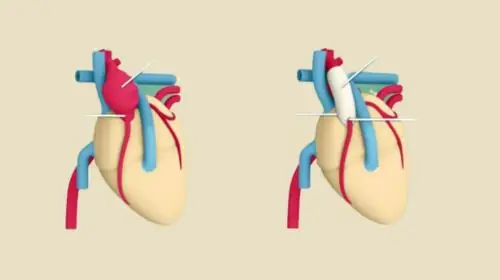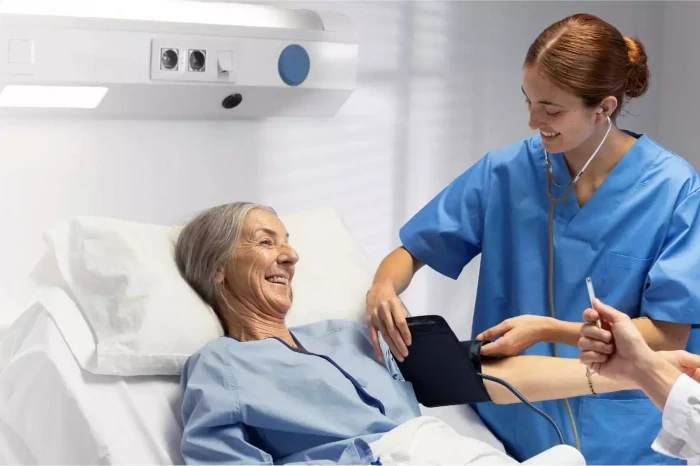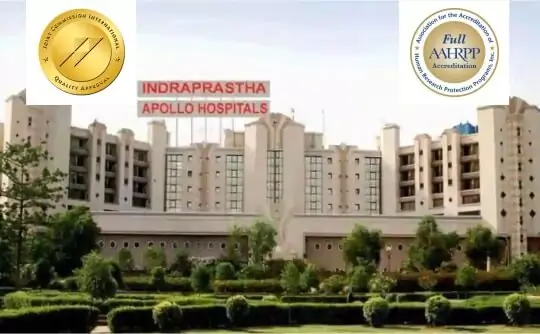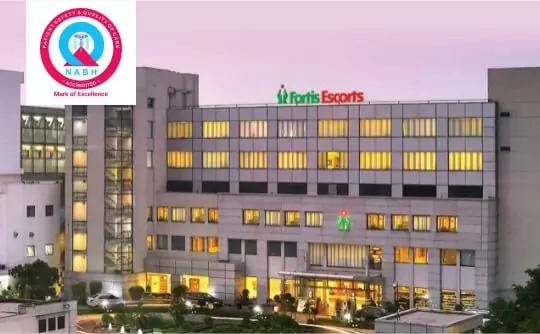

A significant component of Bentall Procedure Cost in India is the heart surgeon's fees. IndiCure recommends highly experienced, skilled, board-certified heart surgeons who can deliver excellent results. While the charges may vary based on the surgeon's experience, you can be confident that you are in safe and capable hands when opting for affordable heart surgery in India with the cardiac surgeons recommended by IndiCure Health Tours.
In the pursuit of enhancing patient care, the medical field continually introduces new techniques and technologies into surgical procedures. These innovative advancements are designed to improve outcomes, reduce recovery times, and increase the overall effectiveness of treatments. While these advancements can significantly benefit patient care, they may also lead to higher cost of Bentall Procedure Cost in India.
Selecting an accredited medical facility with skilled and qualified medical staff is essential for the success of Bentall procedure in India. Larger cities in India generally provide superior medical facilities and more experienced heart surgeons, leading to higher costs. IndiCure Health Tours chooses to recommends surgical facilities in these larger cities of India to prioritize quality of care and ensure safety of our overseas patient guests.
Total surgery-related expenses include the expenses incurred pre- and post-surgery. The pre-surgical expenses vary with the age and medical condition of the patient and thus requiring different number and type of investigations. The post-surgical expenses include prescription medications, number of follow-up consultations required.
At IndiCure Health Tours, we consolidate most of the expenses for your Bentall Procedure Cost in India to provide you with an inclusive and cost-effective package tailored to your budget and individual requirements. After receiving medical reports, your case manager will provide an estimated cost based on a discussion with the heart surgeon.
The final Bentall Procedure Cost in India can however be confirmed after your face-to-face consultation with the heart surgeon in India.

We Help you Choose the Right Treatment, Surgeon & Hospital

We Arrange Video/Telephonic Consultation with the Surgeon

We Assist you with Visa & Accommodation

We Receive you at the Airport and Drop you at Hotel/Hospital

We Assist you the at Hospital & Provide Post Operative Support
IndiCure Health Tours enables exclusive savings on your medical travel to India. We choose to partner with the best hospitals in India and negotiate special rates with them. This ensures you get the best possible price on your healthcare when you plan your medical travel with us.

Here is a set of questions you should consider asking before commencing your medical journey for Bentall Procedure in India.
Prepare to answer questions about your:
Bentall procedure is a type of heart surgery that helps to address aorta issues. Your aorta transports oxygen-rich blood from your heart to the rest of your body. Your aorta is the largest artery in your body, measuring roughly 30 centimeters long and 2.5 centimeters wide.
The Bentall procedure involves composite graft replacement of the aortic valve, aortic root, and ascending aorta, with re-implantation of the coronary arteries into the graft. This operation is used to treat combined disease of the aortic valve and ascending aorta, including lesions associated with Marfan syndrome.
The procedure is named for Hugh Bentall, who first performed and described it in 1968.
A multitude of medical conditions can cause difficulties with the aorta and aortic valve. Marfan syndrome, a hereditary disease that affects a person's connective tissue, including some of the tissues in the aortic root and valve, is one of the most common problems.
A person with Marfan syndrome may develop an aneurysm in their ascending aorta, in addition to other medical issues. (An aneurysm is a weakening of the artery wall that causes the artery to bulge or distend. The majority of aneurysms have no symptoms and are not hazardous. Some, however, can burst at their most severe stage, resulting in life-threatening internal bleeding).
In addition to other potential medical problems, a person with Marfan syndrome might have an aneurysm form in their ascending aorta.
This can cause the artery to burst, resulting in a potentially fatal situation. Intervention, such as the Bentall technique, is required to prevent this. If an aneurysm has already ruptured, the Bentall treatment may be required as an emergency surgery.
The Bentall surgery is indicated for the following conditions of the aorta:
An aortic root aneurysm might not always require surgical correction (such as a Bentall procedure). The benefits of surgery must be weighed against the risks of not having surgery.
Bentall surgery is done under general anesthesia and takes about 4-5 hours. You are connected to a heart-lung bypass machine during the operation on the heart and adjacent structures. This equipment can do the functions that your heart and lungs regularly perform. This enables the surgeon to momentarily halt your heart while he or she works on the aorta and its valve.
In the first step, the surgeon makes an incision along the chest to access the heart, specifically aiming for the aortic valve and the aorta. During this part of the procedure, you'll likely be connected to a heart-lung machine, which temporarily takes over the function of your heart and lungs.
The surgeon carefully clamps the aorta to temporarily stop blood flow in the affected area. This allows them to work on the aorta and aortic valve without blood obscuring the surgical site. Following this removal, the surgeon will attach a prosthetic tube, known as a graft, to replace the removed section.
The surgeon will surgically connect one end of the graft to your remaining, normal aorta. The other end containing the valve is also sewn into the heart. The surgeon will also need to sew the coronary arteries (that bring blood to the heart itself), to make sure they receive adequate blood flow after the operation.
You'll be transferred to the intensive care unit for a day or two and connected to a ventilator, where your vitals will be monitored. You would then be shifted to your room where you would stay for 5-6 days under medical supervision. Your doctor will give you a list of instructions to follow before you are released, such as:
The Bentall procedure, a complex heart surgery, typically has a high success rate, offering promising outcomes for patients. This operation replaces the aortic valve, aortic root, and ascending aorta, often involving coronary artery reattachment. Here's what patients can generally expect:
Ultimately, the Bentall procedure offers a pathway to a healthier, more active life for many patients with severe aortic conditions.

New Delhi
Indraprastha Apollo Hospitals, New Delhi is a state of the art multi speciality tertiary-care hospital situated in the most posh area of South Delhi. Considered to be the flagship hospital of Apollo group, Indraprastha Apollo Hospital is one of the important landmarks not only in Delhi, but in the world map because of its popularity among the medical tourists. The hospital has been one of the most sought after medical institutions for patients from Asia Pacific and beyond.

New Delhi
Fortis Escorts Heart Institute and Research Centre is one of the most revered medical institutions not only in India, but the entire world. The institute has set benchmarks in cardiac care with path-breaking work over the last 25 plus years. The hospital has the most advanced technology and has seen the best outcomes even in the most complex cardiac cases; be it cardiac surgery, Interventional Cardiology, Pediatric Cardiology, Pediatric Cardiac Surgery or Non-invasive Cardiology
Independent predictors of long-term mortality were age (OR 1.16; CI: 1.08-1.23), emergency surgery (OR 28; CI: 4-192) and BAV (OR 3; CI: 1.3-6.9). Conclusion: The Bentall procedure is a safe and durable operation, with very good early and long-term results and a low rate of reoperation.
References : https://pubmed.ncbi.nlm.nih.gov/24779339/
The Bentall procedure is named after Hugh Bentall, a British cardiac surgeon, and Antony De Bono, a British cardiologist. Together, they first described this technique in 1968. It was developed to replace both the aortic valve and a portion of the aorta, often addressing serious conditions like aneurysms or dissections of the aortic root. By innovating a method to combine aortic valve and root replacement in one procedure, Bentall and De Bono created a comprehensive solution for patients requiring complex aortic surgery, making the technique highly significant in cardiac surgery and thus lending it the name "Bentall procedure".
You would typically need to stay in India for approximately three weeks for the Bentall procedure. This duration includes the pre-operative consultations and tests, the surgery itself, and a monitored recovery period to ensure there are no complications before traveling. The recovery period is critical to allow your body to adjust, to address any potential issues, and to ensure you have the strength and stability to fly back safely.
The Bentall procedure generally takes about five hours. The length of time can vary slightly depending on each patient's unique needs, including the complexity of the surgery and whether additional repair or replacement of the ascending aorta is required. During these five hours, the surgeon carefully removes the diseased portion of the aorta and replaces it with a synthetic graft, along with a new aortic valve if needed.
Yes, the Bentall technique is an open-heart surgery. This method involves replacing both the aortic valve and the aortic root, sometimes including part of the ascending aorta, depending on the patient's specific condition. The heart must be temporarily stopped during the surgery, and the patient is connected to a heart-lung machine to maintain blood circulation. This allows the surgeon to perform the complex, precise procedure on the aortic root and valve safely.
When planning your medical trip to India for a Bentall Procedure Cost in India, it is essential to account for several other expenses beyond the surgery itself. Proper budgeting will help ensure a smooth recovery and a stress-free stay. Here's a breakdown of costs to plan for:
Meals
You will need to budget for daily meals throughout your stay, both for yourself and any companions traveling with you. Depending on your dietary preferences and choice of dining (e.g., hotel restaurants, local eateries, or delivery services), meal costs can vary. Some hospitals or accommodations may offer meal packages, which could help you save.
Airfare
Flight expenses are a key component of your trip. Airfare costs will depend on several factors, including your departure location, travel season, class of travel, and how far in advance you book your tickets. Booking early and monitoring for discounts or promotional fares can help reduce costs.
Ground Transportation
Once in India, you'll need to arrange local transportation. This includes taxi fares, ride-sharing services (like Ola or Uber), or private rental cars to travel between the airport, hotel, and hospital. Depending on your treatment schedule and recovery needs, you may also need to budget for trips to pharmacies or follow-up appointments.
Accommodation
Your lodging during recovery is another critical factor to plan for. You can opt to stay in a hotel near the medical facility for convenience or explore alternative options, such as service apartments, Airbnb rentals, or hospital guest houses, based on your budget and personal preferences. Some facilities may even offer special accommodation packages for international patients.
By carefully accounting for meals, airfare, transportation, and accommodation, alongside the Bentall Procedure Cost in India, you can create a comprehensive budget. This will ensure a comfortable and well-planned trip, allowing you to focus on your recovery without unexpected financial stress.
Enhance your medical journey to India by availing these extra services.
Traveling abroad for medical reasons may be challenging. With our experience of over a decade and working with the best surgeons and top hospitals in India, we help make your medical tour easier and safer for you. We will guide you at every step of the way and make end-to-end arrangements for your surgery, travel, and stay.
Ramandeep Dhaliwal
a month ago
I had great experience having rhinoplasty through Indicure. Dr. Ruchika from Indicure has helped me in finding best plastic surgeon, answering all my questions...
Read More
Joshua Archer
3 months ago
My name is Joshua Archer I'm from New Zealand, bay of plenty, kawerau I opted for the bypass surgery in January 2023 but planned it in advance for 28 September found IndiCure...
Read More
Kera Ren
8 months ago
Absolutely loved my experience with IndiCure - from first inquiring to meeting the surgeon pre op to my follow up post op. The surgeon was extremely approachable...
Read More
Andreana Paul
5 months ago
Had a wonderful experience. Visited India for my plastic surgery. From sending mails, airport pickup, comfortable accommodation and, to smooth hospital appointment booking...
Read More
Brandi Luce
5 months ago
I had the privilege of using Indicure's services for a cosmetic procedure that I had wanted for a long time but had always been apprehensive about. Ruchika helped me...
Read More
Jade M
3 years ago
Indicure Health Tours went above and beyond my expectations. They helped me with every aspect of my journey and were professional, kind and caring. I was...
Read More
The content on the website (www.indicure.com) is intended to be general information and is provided only as a service. All photographs on our website of before and after results are examples only, and do not constitute an implied or any other kind of certainty for the result of surgery.
Learn about IndiCure Health Tours' comprehensive editorial policy that strives to deliver trustworthy, helpful, relevant, accurate and people-first content on medical tourism in India.
It is not medical advice and should not be taken as medical advice. It should not be used to diagnose or treat a health condition and is in no way meant to be a substitute for professional medical care. You are advised to see a surgeon in person to assess what surgery may or may not accomplish for you.
It is also important to keep your expectations realistic and to understand that all surgical procedures carry risks and should never be taken lightly.